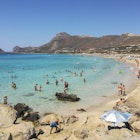
All you need to know before visiting beautiful, quirky Anchorage

Feb 26, 2022 • 8 min read

Anchorage has felt more and more like a big city in recent years – but hasn’t lost its one-of-a-kind charm © Jacob Boomsma / Shutterstock
In recent years, a large influx of new arrivals has transformed Anchorage from a small town into a big city.
In fact, Anchorage – the largest city in Alaska – now accounts for 40 percent of the state’s total population. However, that doesn't mean that the city has lost its special charm. For locals, trips to the supermarket can take hours because it’s pretty much required that you stop and greet anyone you recognize – which will be almost everyone.
Anchorage is a friendly and relatively safe place to visit, though its growing size means crime rates have also increased. While you’re unlikely to find yourself in trouble, you should treat Anchorage as a large city and stay vigilant. But don’t let that put you off: the eccentric quirks, friendly people and laid-back style here are worth enjoying to the fullest.
Anchorage is a year-round vacation destination
There is never a bad time to visit Anchorage. (Well, you might try to avoid March, when all the snow melts into muddy puddles and the city is covered in a thick layer of dust.) In every season, visitors can find fun things to do.
Anchorage enjoys almost 23 hours of uninterrupted sunlight in the summer, which means midnight hikes, fishing and other outdoor activities. The fall is marked by the Alaska State Fair and is the last big hurrah before the snow arrives. In the winter months, you can expect to see the northern lights and the 10-day Fur Rendezvous celebration. April and May are considered the shoulder season, so you can score some fantastic deals on excursions and hotel stays.
Really, Anchorage is a choose-your-own-adventure destination that is jam-packed with ways to explore any time of year.

Anchorage is close to some of Alaska’s best outdoor experiences
Almost uniquely among American cities, Anchorage is equal parts urban and untamed. Where else in the world can you fish for gigantic king salmon while surrounded by a bustling metropolis? How about seeing moose and bears stop traffic? In Anchorage, that’s just another ordinary day.
Three blocks away from the heart of downtown is the Tony Knowles Coastal Trail. Despite heavy bike and foot traffic, it is not uncommon to see moose, bears, cranes and eagles along the pavement. And that’s before you consider easy day trips from Anchorage. Head 10 miles south of Downtown, and you’ll find yourself in the region’s playground, the Chugach Mountains. Or take a scenic 30-mile drive north of town to traverse the breathtaking Hatcher Pass.
Try learning how to speak like an Alaskan
Between 1970 and 1980, Anchorage enjoyed a major economic boom that attracted oil and railroad workers from all over the world. In response, locals began devising new words that would easily identify what came to be known as “outsiders.” This language is still used today, and – you guessed it – locals still use insider vocabulary to suss out visitors. Learning some of the following terms can help if you’re hoping to blend in:
Cheechako: a newcomer to Alaska
Sourdough: a long-time Alaskan
Outside/outsider: any place that is not Alaska and anyone who was not born in Alaska
Lower 48: the contiguous United States
Termination dust: the first snowfall that sticks to the top of the mountains each year
Quyana: “thank you” in the Indigenous Yup’ik language
Snowmachine: nothing will out you faster, or upset a local more, quite like saying “snowmobile”
Leave your designer clothing at home when visiting Anchorage
A cursory search through Tinder will confirm that Anchorage is not exactly a fashion capital. You will rarely see a woman wearing a pair of heels and a designer dress, even on New Year’s Eve, opting instead for Salmon Sisters Xtratufs and a pair of Levis. Men often follow suit and generally sport loose-fitting jeans or Carhartts, sneakers and some iteration of flannel. Even in the business realm, suits and even sport coats are mostly things of the past. So, unless your plans include fine dining at the Crow’s Nest or Seven Glaciers, you can leave your dress clothes at home.

The dos and don’ts of interacting with Anchorage’s wildlife
New York City has its rats; Alaska has mosquitos that will haunt your nightmares. Named the unofficial Alaska state bird, mosquitos here typically hunt in packs for any exposed flesh. The swarms are worst in the spring and early summer, and multiple bites can leave you with large, itchy rashes. To protect yourself, it’s always a good idea to carry heavy-duty DEET and several layers of clothing with you. Alaskans also condone the smooshing of as many mosquitos as you can get your hands (or fly swatter) on.
Anchorage is home to larger wildlife, too. It is not uncommon to see a moose stop highway traffic or a bear rifling through a dumpster as eagles soar overhead. However, that does not mean that you should approach these animals, no matter how friendly they may seem. Especially when they have calves with them, moose are extremely dangerous and temperamental, and will charge you if they feel you are getting too close. A telling sign is twitching ears, which indicate that the moose is uncomfortable. The best thing to do in that situation is to back away slowly.
Similarly, bears are not to be trifled with – keep in mind that they can reach top speeds of 35mph and weigh up to 1500lbs. So to snag those envy-worthy wildlife photos, you'd be better off (and a whole lot safer) visiting either the Alaska Zoo or the Wildlife Conservation Center.
Staying safe in Anchorage and what to do in an emergency
Like any city, there are some places in Anchorage that visitors should probably steer clear of. Generally speaking, the Gambell Street intersection between E 12th Ave and E 16th Ave should be avoided if you are on foot. Additionally, 1st Ave and 3rd Ave should be skipped.
Should you find yourself in an unsavory situation, Anchorage’s Police Department is very responsive, as are the bouncers at most bars. You can report sketchy behavior and other non-emergencies by calling 311, which triggers a public safety team to investigate. If you are out enjoying one of the city’s many bars and feel unsafe for any reason, tell a bartender or a bouncer, and they will get help. As always, if you find yourself in an emergency, always call 911.
Earthquakes can happen; here’s what to do
On November 30, 2018, at 8:29am local time, Anchoragites were unpleasantly reminded of their proximity to the Pacific Plate as the city shook with a 7.0 earthquake. Though roads collapsed and buildings sustained significant damage, the city was back up and running within 48 hours. The reason? Earthquakes happen a lot in Alaska. After the 9.2-magnitude earthquake in 1964, many of Anchorage’s buildings were rebuilt on rollers to minimize structural damage from future temblors. While this ultimately increases safety, finding yourself in one of these buildings can make even mild earthquakes feel unnerving. When this happens, the best thing to do is stay calm and remain in place, as most small quakes come and go quickly without causing damage.
In the unlucky event that there is a large earthquake while you’re visiting, remember the advice from the highest authorities: “Drop. Cover. Hold on.” The city will communicate emergency plans over the radio on 750 AM KFQD and on KTUU-TV Channel 2. Here’s to do if you’re in Alaska during an earthquake:
Drop to your knees and find the nearest sturdy table to crawl under.
Cover your neck and head with one arm.
Hold on to the table leg to make sure you stay covered and remain under the table until the shaking stops.
Navigating Anchorage’s hospitals
Accidents happen, especially in a place where outdoor activities are a way of life. In the unlucky instance that you need medical care, Anchorage has two public hospitals, Providence Medical Center and Alaska Regional Hospital. While you will receive excellent care at either hospital, there are some significant differences between the two.
Alaska Regional Hospital’s emergency department generally has very short wait times. (You can even check out your predicted wait time on the homepage of the institution’s website.) On the downside, there is a reason for their short wait times: most locals prefer Providence. As Alaska Regional is a for-profit hospital, they tend to charge more for basic services than Providence, and their debt forgiveness is minimal. If you anticipate needing a payment plan to pay your hospital bill, you might want to consider going to Providence. As a nonprofit, Providence offers debt forgiveness for qualifying patients.
There’s a cannabis dispensary on every block
Since recreational cannabis became legal in Alaska in 2017, dispensaries have begun popping up on every corner. Currently, there are over 40 dispensaries in Anchorage, with more on the way. Although cannabis consumption is widely accepted in the city, there are some important laws to make sure you know before partaking. Here’s is what to know about cannabis dispensaries in Anchorage.
You must be 21 or older and have a valid form of ID to enter a dispensary.
The possession limit is 1 ounce (28 grams) per person.
Cannabis may not be consumed in public or on any public land.
You can have cannabis and cannabis paraphernalia in your vehicle, but you may not drive under the influence.
Law enforcement may base DUI arrests on observed impairment.
If arrested for a DUI, you will face prison time, a fine and points off of your license.
It is illegal to transport cannabis purchased in Alaska across state lines.
You may also like:
Immerse yourself in Alaska’s beauty with these outdoor adventures in Anchorage
How to enjoy Anchorage for free, come sunshine or snow
16 ways to explore Anchorage, Alaska’s biggest city
Explore related stories

Wildlife & Nature
The 8 best places to visit in Alaska with beautiful scenery at every turnMar 19, 2024 • 5 min read

 Wildlife & NatureAntarctica vs the Arctic: which polar wilderness is for you?
Wildlife & NatureAntarctica vs the Arctic: which polar wilderness is for you?Aug 3, 2023 • 7 min read







